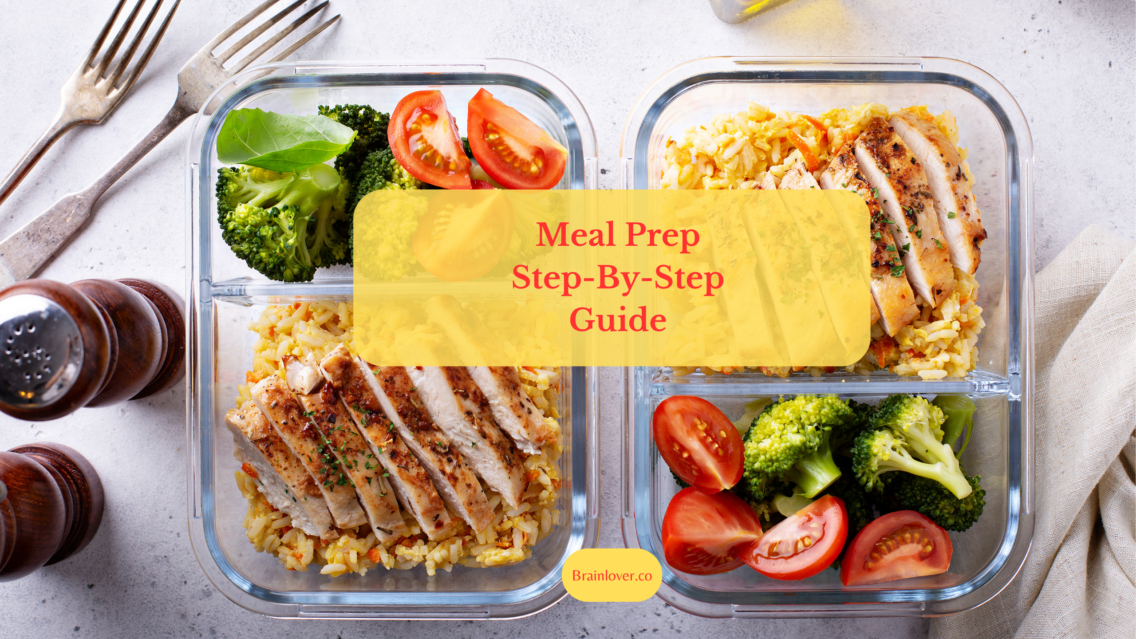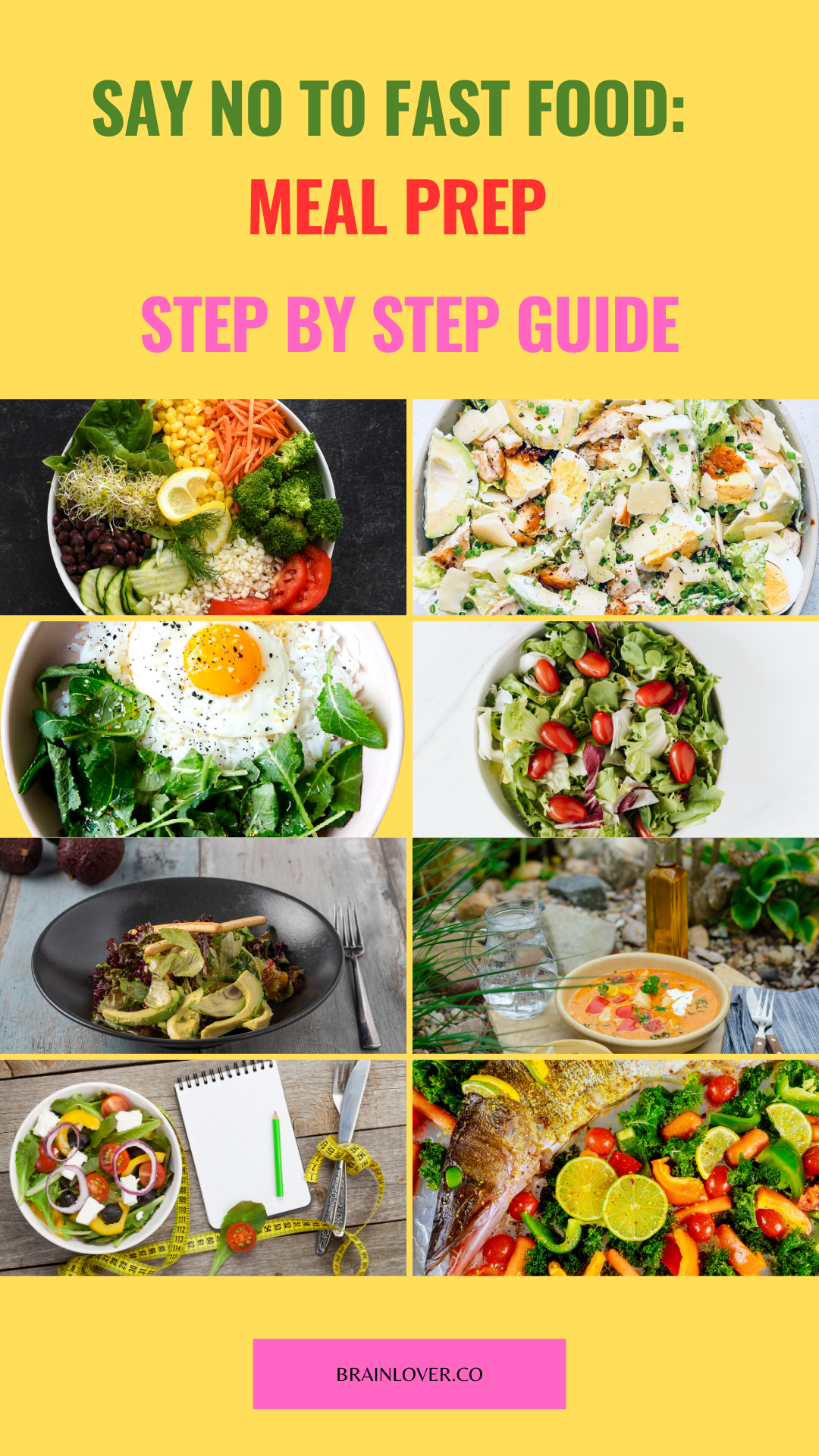Discover Game-Changing Meal Prep Ideas for Effortless Living

Struggling to balance the chaos of everyday life while maintaining a healthy diet?
Meal prep ideas may be the solution you’re looking for.
This ultimate guide will walk you through the basics, benefits, tools, and steps needed for meal prepping.
It also offers meal prep ideas, helpful tips, and common mistakes to avoid.
Understanding the Basics of Meal Prep

Meal prep, in essence, is a proactive approach to meal planning.
It requires foresight and organization to plan your meals for the upcoming week, typically executed in one cooking session.
The whole process begins with the selection of a menu.
This involves deciding on the meals you want to have throughout the week.
Once that’s decided, you must procure the ingredients required for these meals. The next step is cooking, bringing the chosen recipes to life.
Lastly, the meals are portioned into individual servings and stored in containers.
This way, you have a variety of ready-to-eat meals available throughout the week.
This methodical process not only simplifies mealtime decisions but also serves to conserve time, money, and energy.
It eradicates the need for daily cooking and mitigates the temptation of unhealthy, impromptu meals.
So, if you want to streamline your weekly meals and alleviate some of your daily stress, meal prep could be your saving grace.
Benefits of Meal Prep
There are several significant advantages to incorporating meal prep into your routine.
The first is that it’s a great time and money saver.
When you take a couple of hours one day each week to prepare your meals, you significantly cut down on daily cooking and cleaning time.
Furthermore, purchasing ingredients in larger quantities often equates to spending less in the long run.
The second significant benefit is that meal prep aids in maintaining a balanced diet.
With meals already planned and prepared, it’s far easier to stick to nutritious options and avoid reaching for unhealthy, convenience foods.
Lastly, it contributes to stress reduction.
The dilemma of deciding what to cook every day is eliminated, as your meals are ready when you are.
No more scrambling to pull together last-minute meals, giving you peace of mind and making meal times a more enjoyable experience.
By investing time and effort into meal prep, you can reap these benefits and transform your diet and daily routine.
The rewards of this practical approach to food far outweigh the initial effort of planning and prepping.
And remember, as with any new habit, starting is the hardest part.
Once you get into the rhythm of meal prepping, it’ll become a seamless part of your weekly routine.
Necessary Tools for Meal Prep
Venturing into the world of meal prep requires a few fundamental tools to ensure your success.
These basics will create a smoother and more efficient meal prep process.
First off, quality meal prep containers are crucial.
These will store your meals and keep them fresh throughout the week.
Look for durable ones that can be used in the microwave, preferably free of BPA. Or even better, Glass Containers.
Second, cooking tools such as pots, pans, a reliable knife, a cutting board, and baking sheets are essential.
These workhorses in your kitchen will see you through each prep session.
Lastly, precise portioning is critical in meal prep.
This helps maintain a balanced diet and prevents overeating. Measuring tools like cups, spoons, and a kitchen scale can assist with this.
Remember, investing in good quality tools from the start can make the meal-prepping process less daunting and more enjoyable.
Equipped with the right tools, you can step into the kitchen and kick off your meal prep journey!
How to Start Meal Prepping: A Step-by-Step Guide
Start your meal prep journey with a systematic approach.
First, strategize your meal plan instead of rushing in blindly; begin prepping meals for a few days and gradually extend it to a week.
Opt for dishes that are easy to prepare in large quantities and offer variety and nutrition.
Following this, prepare a shopping list in alignment with your meal plan, focusing on ingredients that can be used in multiple recipes.
Once your shopping is done, designate a day for bulk cooking.
Prepare your selected recipes and divide them into portions using meal prep containers.
Lastly, ensure your meals are appropriately stored.
You can refrigerate or freeze your meals depending on when you eat them.
Remember, most prepared meals can remain in the fridge for 3-5 days.
Adhere to these steps, and you’ll effectively incorporate meal prepping into your lifestyle, enjoying its numerous benefits.
Sample Meal Prep Ideas
Looking for inspiration for your first meal prep?
Check this recipe for more inspiration.
Here are a few suggestions to spark your creativity and excite your taste buds.
- **Loaded Omelettes:** Beat some eggs, add ingredients like diced veggies, cheese, and pre-cooked Turkey Bacon (or any Kind), then pour the mixture into muffin tins. After baking, you’ll have handy, single-serving omelets for grabbing on busy mornings.
- **Greek Quinoa Bowl:** Combine fluffy quinoa, sliced cucumbers, juicy tomatoes, olives, and crumbled feta, all dressed with a zesty lemon vinaigrette. This Mediterranean-inspired meal offers a fantastic combination of nutrients and flavors.
- **Shrimp and Broccoli Stir-Fry:** Sauté shrimp and broccoli in a tangy garlic sauce for a light and flavorful meal. Pair this stir-fry with a cup of pre-cooked brown rice to make it more filling and ensure you have a complete meal prepped for whenever hunger strikes.
Remember, these are just examples. Feel free to mix and match ingredients based on your preferences and dietary needs.
The goal is to create meals you’ll look forward to eating, so don’t be afraid to get creative in the kitchen!
Tips for Successful Meal Prep
Remember the following tips to ensure a smooth and successful meal prep journey.
First, take a gradual approach. Rather than trying to prepare a whole week’s worth of meals in one go, begin with a few days.
This way, you’ll slowly get accustomed to the process without overwhelming yourself.
Secondly, make a conscious effort to incorporate multipurpose ingredients into your meals.
You can use these ingredients across various dishes, which helps save money and decrease food waste.
Finally, stick to simplicity. Opt for straightforward recipes that require fewer ingredients.
Not only will this speed up your prep time, but it can also help you discover dishes that are both quick to make and delicious.
The key is not to complicate the process.
Simple meals can be equally satisfying and flavorful.
By following these guidelines, you’ll be on your way to becoming a seasoned meal prepper, making your weeks more organized and your meals more enjoyable.
Remember, practice makes perfect, and the more you get into the rhythm of meal prepping, the easier and more efficient it will become.
Common Mistakes to Avoid in Meal Prepping
As you embark on your meal prep journey, avoiding these common pitfalls can save you time, effort, and potential disappointment.
First, pay attention to portion sizes. While meal prepping does aid in maintaining a healthy diet, overeating—even healthy food—can still have negative consequences.
Use measuring tools to ensure you’re not overfilling your meal prep containers. Secondly, diversity is essential.
Rotating your menu prevents mealtime monotony and ensures you’re getting a variety of nutrients.
Try incorporating different proteins, grains, and veggies throughout the week to keep things interesting.
Lastly, don’t neglect food safety. Safeguard against foodborne illnesses by storing your prepared meals properly.
Use quality containers, refrigerate promptly, and consume meals within 3-5 days unless frozen.
Avoiding these mistakes enhances your meal prep experience and optimizes the health benefits.
Armed with these tips, you’ll be well-equipped to tackle any challenges that come your way during your meal prep endeavors.
Remember, every new skill has a learning curve, so don’t be discouraged by early mistakes. With time and practice, meal prepping will soon become a beneficial part of your weekly routine.
Q&A
Can meal prepping be customized for different dietary restrictions or preferences?
Absolutely! For instance, if you’re following a Keto diet, your meal prep can consist of tofu stir-fry and quinoa salads. Similarly, for a ketogenic diet, your prep might be focused on dishes like baked salmon and sautéed spinach.
Are there any time-saving tips for meal-prepping multiple dishes at once?
Yes, there are several tips to save time while prepping meals. One effective way is to utilize similar ingredients for multiple dishes.
For instance, you can chop many vegetables for a salad, stir-fry, and soup.
Also, cooking grains in large batches and using them throughout the week can save time.
Can you provide some examples of healthy and balanced meal prep ideas?
One idea might be grilled chicken with steamed broccoli and sweet potato, which offers a balance of protein, fiber, and carbs.
Another idea could be a chickpea salad with colorful veggies drizzled with a light vinaigrette for a protein-rich vegan option.
How can I avoid getting bored with my meal prep options?
Variety is critical to avoid getting bored with meal prep options.
Rotate your recipes weekly and try out new cuisines and cooking styles.
You can also experiment with different sauces and spices to change the flavor profiles of your meals.







